Introduction to Physical World | Physics Class 11 - NEET PDF Download
Each one of you has been taught 'Physics' in your previous grades. Have you ever thought, about what this subject is? From the birth of the universe to usual events like the blue color of the sky, the formation of a rainbow, reddish sunrise, and sunset, and, the occurrence of rain, thunder, fog, volcanoes, and earthquakes, etc, physics is everything around you.
The scientific observation of the universe by great physicists like Isaac Newton, and Albert Einstein has led to the discovery of the fundamental rules and laws that govern the universe. This set of rules is physics.
What is Physics?
- It’s really difficult to define exactly what physics is. For one, physics keeps changing as we progress and make discoveries. This makes physics exciting and interesting.
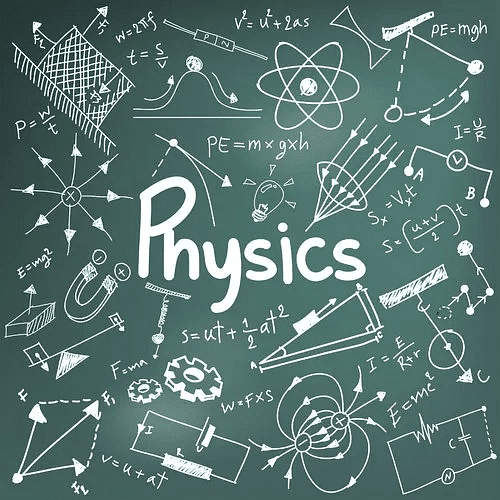
But let's face it, definitions are important, so how do you define Physics? The best way physicists define physics:
Physics is a fundamental science concerned with understanding the natural phenomena that occur in our universe. It is a natural science based on experiments, measurements and mathematical analysis with the purpose of finding quantitative physical laws for everything.
or simply put,
A science that deals with matter and energy, and their interactions.
Branches of Physics
Physics seeks to construct and experimentally test theories of the physical universe. These theories vary in their scope and can be organized into several distinct branches such as Mechanics, Electromagnetism, Thermodynamics, Modern Physics, etc.
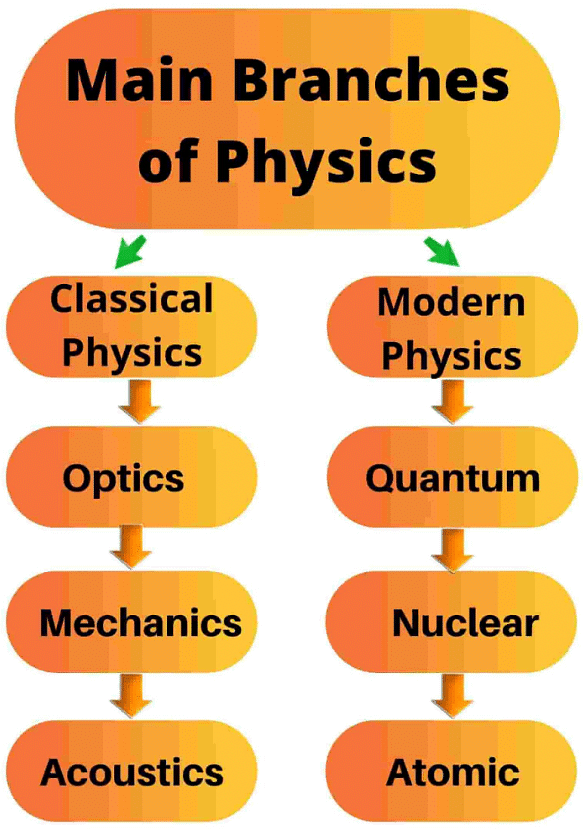 Branches of Physics
Branches of Physics
Principles Governing Physics
There are two principal thrusts in Physics are-
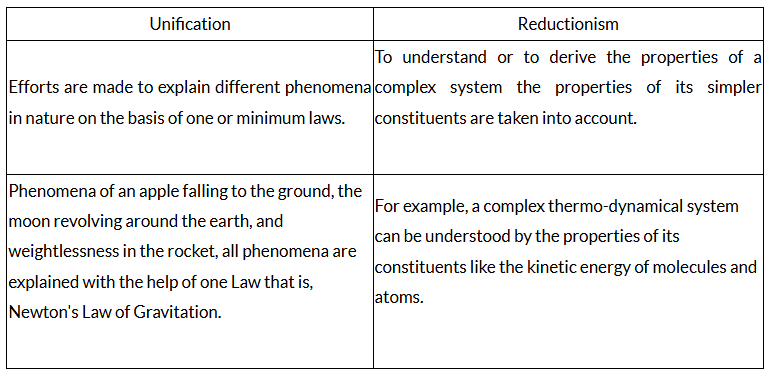
Scope and Excitement of Physics
The scope of physics is very wide and exciting because it deals with objects of size as large as the Universe,1025m, and as small as 10-14m, the size of a nucleus.
- The macroscopic domain deals with matter and objects that are measurable and can be observed by the naked eye.
- Microscopic domain deals with molecules, atoms, and nuclei. It deals with objects that require a lens or microscope to see them clearly.
- Recently third domain in between is also thought of with the name Mesoscopic Physics. This deals with a group of Hundreds of atoms
- Immense excitement is involved in the study of physics since it explains every naturally occurring phenomenon with a set of rules so that a clear understanding can be achieved.
- The excitement of physics comes in conducting new experiments, discovering the different secrets of nature, and then applying the laws of physics for practical purposes.
- And generally, excitement means curiosity to know how it happens or what happens. This curiosity of learning physics is nothing but the excitement of physics.
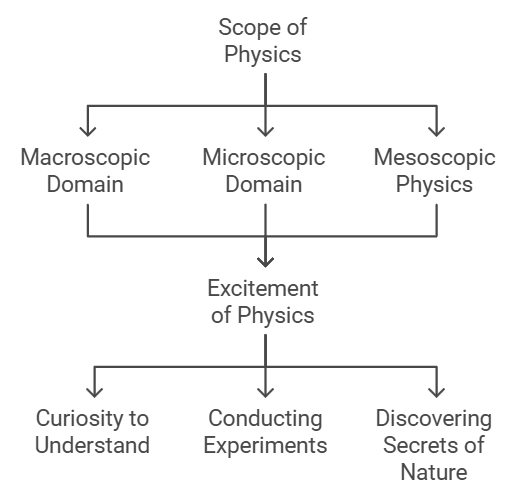
Physics Technology and Society
- Physics is a very significant branch of science that plays a crucial role in understanding the developments pertaining to the other branches of science such as Chemistry, Biology, etc.
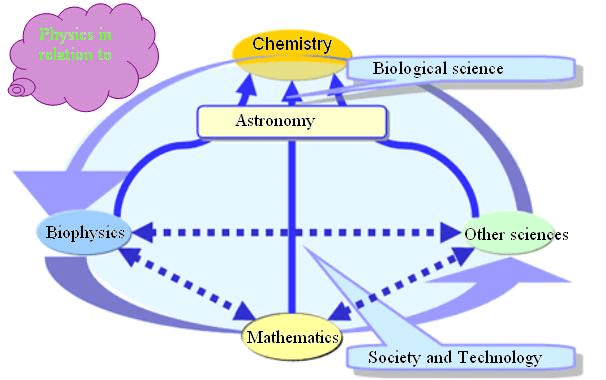 Physics in Relation to Other Sciences
Physics in Relation to Other Sciences
- Physics in Relation to Mathematics: The study of physical variables led to the idea of differentiation, integration, and differential equations. Meaningful interpretation of Mathematics becomes Physics.
- Physics in Relation to Chemistry: The concept of X-ray diffraction and radioactivity has helped distinguish between the various solids and modify the periodic table. Understanding the bonding and the chemical structure of substances is easy with the help of the concept of interactions between various particles.
- Physics in Relation to Astronomy: Optical telescopes of reflecting and refracting type enabled man to explore the space around him. Discoveries like radio telescopes have revolutionized the study of Astronomy.
- Physics in Relation to Biology: The conceptual study of pressure and its measurement has helped us to know blood pressure and hence the functioning of the heart. The invention of X-rays developed the field of diagnosis. Electron and optical microscopic designs have revolutionized the study of medical science.
- Physics in Relation to Meteorology: The discoveries regarding the study of pressure variations help us to forecast the weather. Various other inventions of physics have opened new vistas of study in the field of sciences and social sciences.
- Mutual Influence of Physics and Technology: Advancement in physics has led to new technologies and vice-versa. Sometimes technology gives rise to a new dimension of physics; at other times, physics generates new technology.
- Role of Physics in Technological Development: In fact, technological development is closely related to the application of science and physics in particular. Physics has a dominant influence on society. It has helped human beings to develop their ideas.
- Physics' Impact on Society: The development of digital communication systems, rapid mass transport systems, lasers making bloodless surgeries, etc., has made human life easy and pleasant.
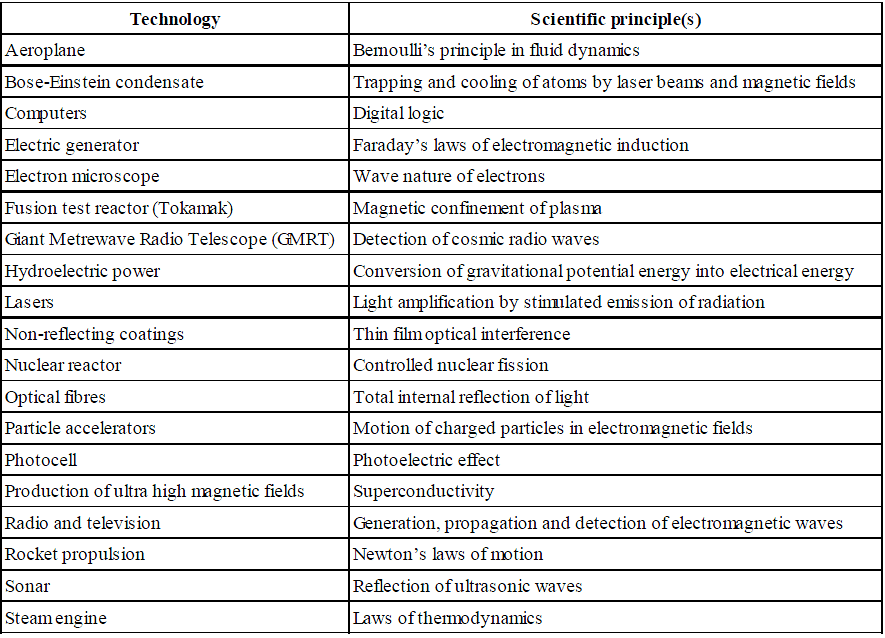 The link between Technology and Physics
The link between Technology and Physics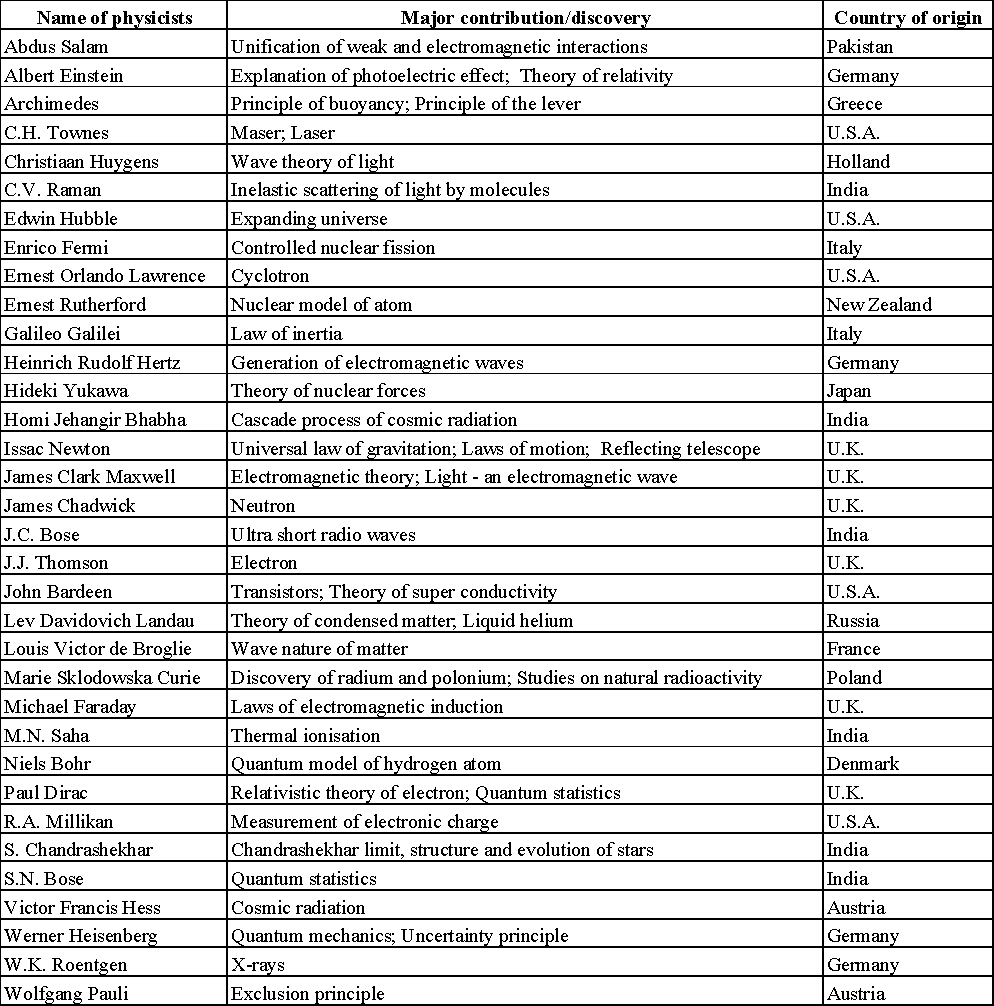 Famous Physicists
Famous Physicists
Fundamental Forces in Nature
There are many different forces that objects can feel or use. Some are big forces that we can see, like gravity, friction, and when things touch each other. Others are tiny forces that we can't see without special tools, like electrical forces between atoms.
But all these forces come from some simple forces we call "Fundamental Forces."
 Types of Fundamental Forces
Types of Fundamental Forces
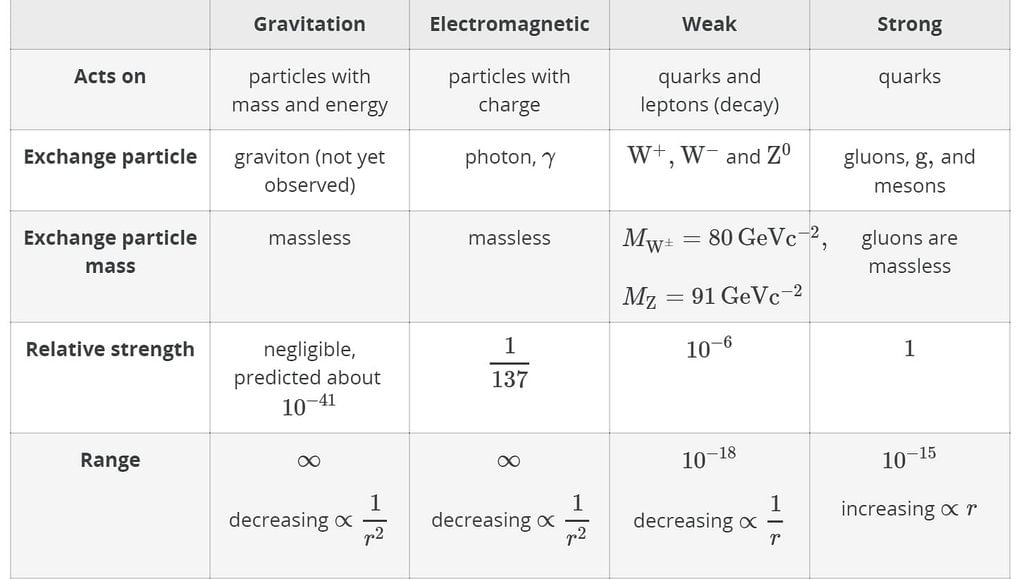 Properties of Fundamental Forces
Properties of Fundamental Forces
Summary
Physics is a science that deals with matter and energy, and their interactions
There are two domains of interest in the field of physics. They are the macroscopic domain and microscopic domain. The macroscopic domain deals with matter and objects that are measurable and can be observed by the naked eye. Microscopic domain deals with molecules, atoms, and nuclei. It deals with objects that require a lens or microscope to see them clearly.
The excitement of physics comes in conducting new experiments, discovering the different secrets of nature, and then applying the laws of physics for practical purposes.
There are four fundamental forces in nature: Gravitational Force (Weakest force; but has infinite range), Weak Nuclear Force (Next weakest; but short range), Electromagnetic Force (Stronger; with infinite range), Strong Nuclear Force (Strongest; but short range)
Frequently Asked Questions
Q1. Why is Physics called the King of Science?
Physics is called the king of science because it helps us understand how nature works.
It is possible for theoretical physics to exist without Maths but it gets difficult to analyze and describe the universal phenomena without mathematical hypothesis.
Physics and Biology, when combined together, help scientists learn more about biological systems on a molecular or atomic level.
Physics and Chemistry may overlap when the subject under consideration is matter composed of electrons and nuclei made of protons and neutrons.
Physics is important because it helps us understand the fundamental nature of the universe. It improves the quality of life by providing quantitative and analytical skills in fields like engineering, medicine and science.
|
96 videos|367 docs|98 tests
|
FAQs on Introduction to Physical World - Physics Class 11 - NEET
| 1. What is the definition of Physics? |  |
| 2. What are the main branches of Physics? |  |
| 3. What are the fundamental forces in nature? |  |
| 4. How does Physics impact technology and society? |  |
| 5. Why is the study of Physics considered exciting? |  |

















